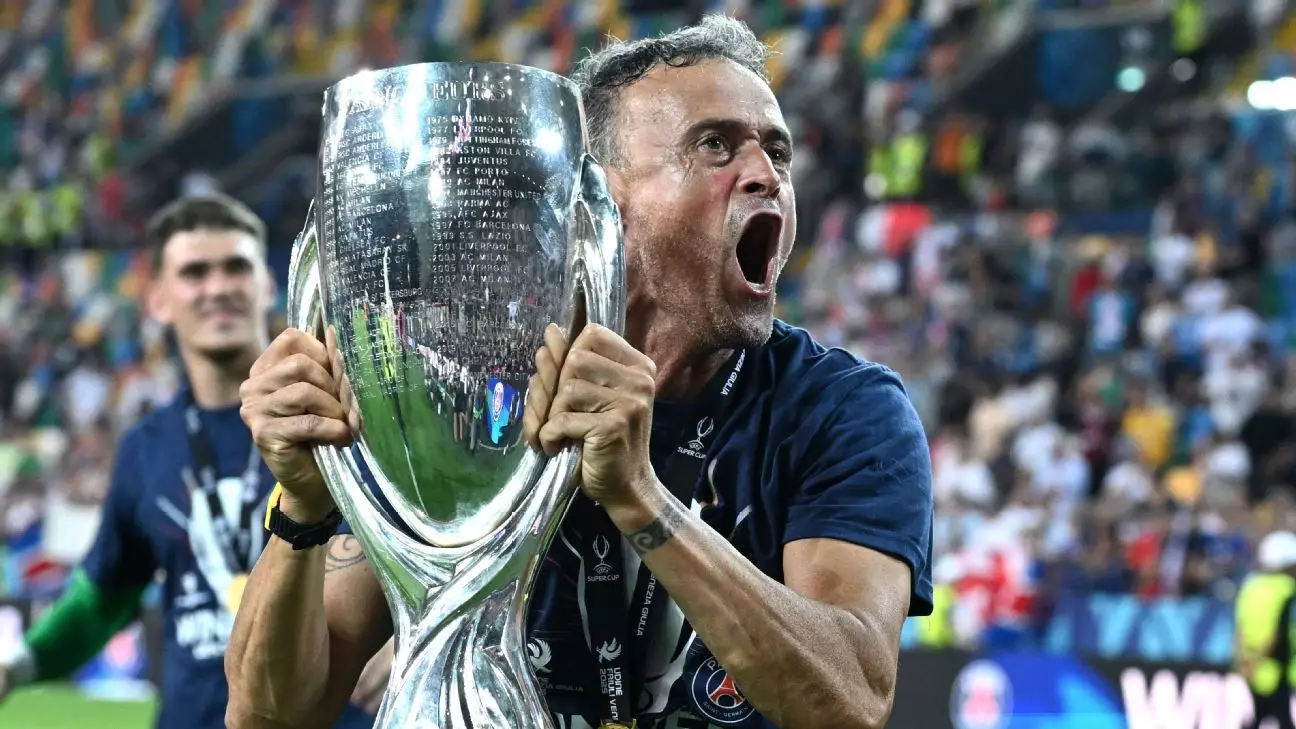The recent UEFA Super Cup clash between Paris Saint-Germain and Tottenham Hotspur was more than just a match; it was a dramatic spectacle that questioned the narratives surrounding team fitness and preparedness. PSG’s victory, achieved through a remarkable comeback in the final minutes, raises critical questions about fairness and the assumptions we often make about conditioning and readiness. The PSG coach, Luis Enrique, candidly acknowledged that his team “didn’t deserve” to win, citing their lack of match fitness as a contributing factor. This honesty reveals a troubling complacency in modern football—where success is often attributed to superior fitness or organizational discipline—ignoring the unpredictable nature of the game itself. It also exposes a dangerous misconception: that physical preparedness alone guarantees victory, rather than embracing the chaos and resilience that define true sporting excellence.
In this context, PSG’s win becomes a case study in the power of mental fortitude amid physical unpreparedness. A team that had only six days of training, fresh from an exhausting run to the Club World Cup final, managed to turn around a 2-0 deficit against a Tottenham side that had six weeks to prepare. This underscores a fundamental truth of sport: success isn’t solely predicated on conditioning but on perseverance, adaptability, and the ability to seize fleeting moments. The narrative here is not simply about a late comeback but a reminder that even underprepared teams can defy expectations through grit—a sentiment that challenges the myth that elite fitness is the ultimate determinant of victory.
The Underdog’s Triumph and Its Implications
The match also highlights the complex psychology of resilience. Tottenham looked set to dominate, particularly in the first 85 minutes, riding high on their superior preparation and tactical discipline. Yet, in a spectacular turn of events, PSG surged back, energized by substitutes Lee Kang-in and Gonçalo Ramos whose goals in the dying moments instilled hope and recalibrated the game’s outcome. This dramatic shift exemplifies how belief and determination can disrupt even the most well-organized strategies. It exposes a flaw in the conventional wisdom that dominant fitness equates to guaranteed success—a flaw that underlines the importance of mental resilience and adaptability.
The penalty shootout, a nerve-wracking culmination, further exposes the unpredictability of football. Tottenham’s missed penalties, contrasted with PSG’s clinical execution, emphasize that victory often hinges on psychological strength and composure—factors that are arguably more critical than physical conditioning. Furthermore, the debut of PSG’s young goalkeeper Lucas Chevalier—who faced high-pressure situations and made crucial saves—symbolizes the importance of mental toughness, even amidst team chaos and transition. Chevalier’s heroics, including a vital save in the shootout, reinforce that individual resilience can influence team outcomes more profoundly than mere fitness levels.
Controversy Surrounds Player Movement and Leadership
A notable subplot of this match is the absence of Gianluigi Donnarumma, PSG’s proclaimed star goalkeeper, who chose not to travel with the team amid rumors of a departure. This decision underscores a broader issue in modern football: the revolving door of player movement and leadership vacuum at critical moments. PSG’s decision to field Lucas Chevalier, despite him being relatively inexperienced at this level, underscores an ongoing gamble with the club’s leadership and team cohesion. It also fuels debates over whether young players should be thrust into high-stakes situations or nurtured gradually—raising questions about how clubs manage transition and the impact on team morale.
Luis Enrique’s comments on Donnarumma’s personality highlight an increasing recognition that individual character traits—like resilience, confidence, and leadership—are essential to success at elite clubs. His departure not only reflects the shifting landscape of club football but also the importance of mental toughness in high-pressure environments. As PSG embraces a new chapter, their ability to nurture and develop mental resilience within their squad will determine whether they can sustain victories like the Super Cup or if they remain at the mercy of fleeting moments of luck and heroism.
The Bigger Picture: Reshaping Expectations in Modern Football
Ultimately, PSG’s victory questions long-held beliefs about what it takes to succeed at the highest level. While physical fitness, tactical discipline, and star power are important, this match underscores the paramount significance of mental resilience, belief, and adaptability. The fact that a team just days into training can overturn a well-prepared opponent suggests that success in football is as much about heart as it is about muscle.
This game should serve as a wake-up call to clubs and fans alike: don’t underestimate the power of perseverance and mental toughness. In an era obsessed with data-driven fitness regimes and tactical precision, the essence of football still lies in its unpredictable spirit. PSG’s resilience—mirrored in the reactions of their players and the unwavering support of their fans—illustrates that, sometimes, the most unlikely victories are the most meaningful. They challenge us to reconsider our definitions of greatness and remind us that, ultimately, football remains a game of passion, guts, and unwavering belief.

